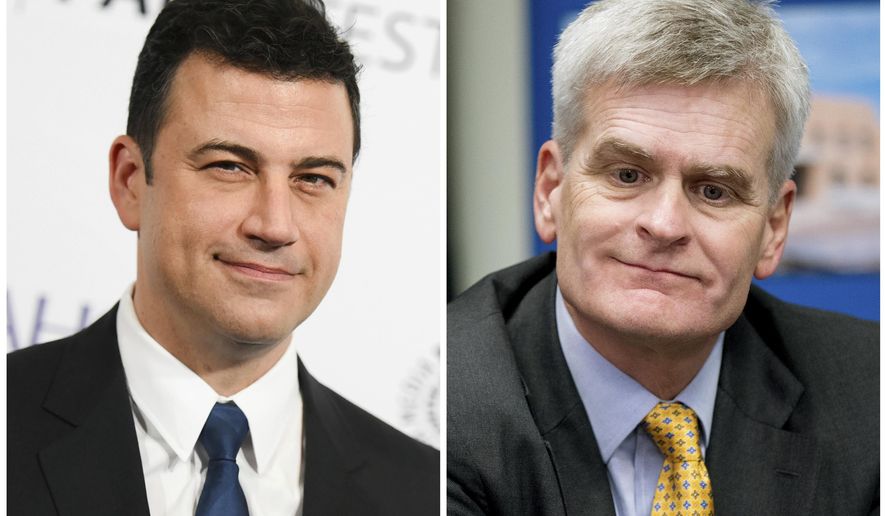NEW YORK (AP) - If the latest Republican attempt to repeal Obamacare doesn’t work, it may become known as the Jimmy Kimmel Non-Law.
The comic’s withering attacks this week have transformed the debate over the bill (sponsored by Sens. Lindsey Graham and Bill Cassidy) and, in the process, illustrated how thoroughly late-night talk shows have changed and become homes for potent points of view.
“Late-night has really become an important part of the civic conversation,” said Robert Thompson, director of Syracuse University’s Bleier Center for Television and Popular Culture, on Thursday.
Kimmel’s monologues on Tuesday and Wednesday were deeply personal. His newborn son underwent surgery in May for a heart defect and faces two more operations. He felt a sense of personal betrayal from Cassidy, who was on the show this spring after Kimmel talked about his son’s medical problems, and felt that Cassidy lied to him about Republican health care plans. Cassidy said the comedian was misinformed.
Kimmel kept it up Thursday, saying that critics who say he’s not qualified to talk about health care are right, but he wonders why some senators aren’t listening to the various health organizations that have come out against the bill.
Kimmel’s initial speech on his ABC show, where a phone number to Congress was flashed on the screen to urge viewers to get involved, quickly spread online and became a focus of news coverage. Cassidy was asked to respond to Kimmel when he appeared Wednesday on CNN’s “New Day.”
New Jersey Gov. Chris Christie, despite his own doubts about the Republican bill, balked in an MSNBC appearance at being compared to Kimmel. “He’s not a serious person,” Christie said.
But Kimmel was deadly serious.
“Before you post a nasty Facebook message saying I’m politicizing my son’s health problems, I want you to know I am politicizing my son’s health problems because I have to,” Kimmel said.
After Fox News Channel’s Brian Kilmeade criticized members of the Hollywood elite “like comedian Jimmy Kimmel for pushing their politics on the rest of the country,” Kimmel blasted him the next night as a “phony little creep” who “whenever I see him, kisses my ass like a little boy meeting Batman.”
Rob Burnett, filmmaker and former executive producer of David Letterman’s “Late Show,” said Kimmel’s monologues were some of the most important things he’s ever seen in late-night television.
“I found myself deeply moved by them and also entertained,” he said. “It’s the full experience.”
The talk shows have become deeply political in the past few years with many and varied voices including Stephen Colbert, John Oliver, Samantha Bee and Trevor Noah. Trace the turn to former “Daily Show” host Jon Stewart, whose advocacy for legislation to help first responders at the World Trade Center was a precedent for Kimmel. Virtually all of the comedy comes from a liberal point of view; Peter Hasson, an editor at the conservative Daily Caller website grumbled on Twitter that “being a comedian now means actually being a lobbyist.”
Kimmel hasn’t steered away from politics in the manner of NBC’s Jimmy Fallon, but he hasn’t made it as big a part of his comedy as many of his colleagues.
Generations ago, late-night comics like Johnny Carson tended to keep their political comedy non-offensive, Thompson said. Their networks didn’t want it; no sense in turning off potential viewers. Now the comics appeal to smaller, niche audiences who are attracted by their passion. Burnett calls it a golden age for late-night comedy.
“As a person who wrote many thousands of jokes for late-night television, they’ve taken it to a whole other level,” he said. “I feel like one of those old-time tennis players who were using wooden rackets.”
Burnett’s old boss, Letterman, straddled the generations. He was aggressively non-political in the early years of his career, and became quite pointed at the end of his time on the “Late Show.”
While comics now have a fraction of Carson’s audience, today’s media world amplifies their impact. If Carson, for example, had delivered a blistering monologue on the Vietnam War - not that his bosses would let him - there was no Internet or cable TV to replay it again and again. But if you didn’t see it live, you didn’t see it.
One casual reference by Kimmel during his first monologue acknowledged he knew how many people would see it. He urged his fans not just to “like” his speech on social media when they saw it, but to take action.
Kimmel also gave attention to an issue, attention Republican leaders surely didn’t want to see, at a time cable television was preoccupied with hurricanes, the Mexican earthquake and ongoing investigation into President Trump’s Russian connections.
“He’s got a candor that we don’t often see,” Thompson said. “Certainly not from comedians but also from political leaders.”




Please read our comment policy before commenting.